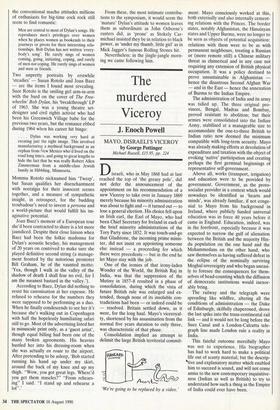The murdered Viceroy
J. Enoch Powell
MAYO, DISRAELI'S VICEROY by George Pottinger
Michael Russell, £15.95, pp. 224
Disraeli, who in May 1868 had at last: reached the top of 'the greasy pole', did not defer the announcement of the appointment on his recommendation of a new Viceroy to take over in January 1869 merely because his minority administration was about to fight and — it turned out — to lose a general election. His choice fell upon an Irish earl, the Earl of Mayo, who had been Chief Secretary for Ireland in each of the brief minority administrations of the Tory Party since 1852. It was touch-and-go that Gladstone, the incoming prime minis- ter, did not insist on appointing someone else instead — a proceeding for which there were precedents — but in the end he let Mayo stay with the job.
One of the ironies of that irony-laden Wonder of the World, the British Raj in India, was that the suppression of the Mutiny in 1857-8 resulted in a phase of consolidation, during which the vista of future British rule was enlarged and ex- tended, though none of its insoluble con- tradictions had been — or indeed could be — resolved. Britain settled down, as it were, for the long haul. Mayo's viceroyal- ty, shortened by his assassination from the normal five years duration to only three, was characteristic of that phase.
Consolidation implied an attempt to delimit the large British territorial commit- 'We're going to be replaced by a video.' ment: Mayo consciously worked at this, both externally and also internally cement- ing relations with the Princes. The border states, notably Afghanistan, the Himalayan. states and Upper Burma, were no longer to be seen as objects of potential acquisition: relations with them were to be as with permanent neighbours, treating a Russian or (more remote still) a Chinese military threat as chimerical and in any case not requiring any extension of British physical occupation. It was a policy destined to prove unsustainable in Afghanistan — hence the disastrous Second Afghan War — and in the East — hence the annexation of Burma to the Indian Empire.
The administration of India and its army was tidied up. The three original pro- vinces, Bengal, Madras and Bombay, proved resistant to abolition; but their armies were consolidated into the Indian Army, stabilised at a manageable size to accommodate the one-to-three British to Indian ratio now deemed the minimum compatible with long-term security. Mayo was already making efforts at devolution of expenditure and taxation with the object of evoking 'native' participation and creating perhaps the first germinal beginnings of representative self-government.
Above all, works (transport, irrigation) and education were to be provided by government. Government, as the proto- socialist provider in a context which would nowadays be identified as 'hearts and minds', was already familiar, if not conge- nial to Mayo from his background in Ireland, where publicly funded universal education was in force 40 years before it came in England. Education, indeed, was in the forefront, especially because it was expected to narrow the gulf of alienation between the British and the majority Hin- du population on the one hand and the Mohammedans on the other hand, who saw themselves as having suffered defeat in the eclipse of the nominally surviving Moghul sovereignty and who began uneasi- ly to foresee the consequences for them- selves of head-counting which the diffusion of democratic institutions would inexor- ably bring.
The railway and the telegraph were spreading like wildfire, altering all the conditions of administration — the Duke of Edinburgh, skilfully chaperoned, drove the last spike into the trans-continental rail link — and it would not be long before the Suez Canal and a London-Calcutta tele- graph line made London rule a reality in India.
This fateful outcome mercifully Mayo was not to experience. His biographer has had to work hard to make a political life out of scanty material; but the descrip- ‘tive and explanatory matter which enabled him to succeed is sound, and will not come amiss to the new contemporary inquisitive- ness (Indian as well as British) to try to understand how such a thing as the Empire of India could ever have been.


























































 Previous page
Previous page